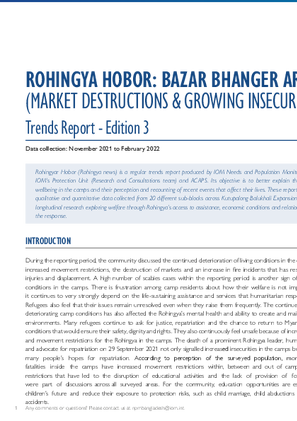-
Countries
-
Data and Analysis
-
Special Focus
-
Crisis Responses
Bangladesh — Rohingya Hobor: Bazar Bhanger Ar Dhor Barer (Market Destructions & Growing Insecurities) Edition 3 (November 2021 -February 2022)

Contacto
NPM Bangladesh, npmbangladesh@iom.int
Idioma
English
Ubicación
Bangladesh
Fecha de instantánea
Nov 01 2021
Feb 28 2022
Actividad
- Survey
- Community Perception
During the reporting period, the community discussed the continued deterioration of living conditions in the camps, including increased movement restrictions, the destruction of markets and an increase in fire incidents that has resulted in serious injuries and displacement. A high number of scabies cases within the reporting period is another sign of cramped living conditions in the camps. There is frustration among camp residents about how their welfare is not improving. Instead, it continues to very strongly depend on the life-sustaining assistance and services that humanitarian responders provide. Refugees also feel that their issues remain unresolved even when they raise them frequently. The continued perception of deteriorating camp conditions has also affected the Rohingya’s mental health and ability to create and maintain safe social environments. Many refugees continue to ask for justice, repatriation and the chance to return to Myanmar with living conditions that would ensure their safety, dignity and rights. They also continuously feel unsafe because of increasing insecurity and movement restrictions for the Rohingya in the camps. The death of a prominent Rohingya leader, human rights activist and advocate for repatriation on 29 September 2021 not only signalled increased insecurities in the camps but also shattered many people’s hopes for repatriation. According to perception of the surveyed population, more attacks with fatalities inside the camps have increased movement restrictions within, between and out of camps. Government restrictions that have led to the disruption of educational activities and the lack of provision of formal education were part of discussions across all surveyed areas. For the community, education opportunities are essential for their children’s future and reduce their exposure to protection risks, such as child marriage, child abductions and road traffic accidents.
